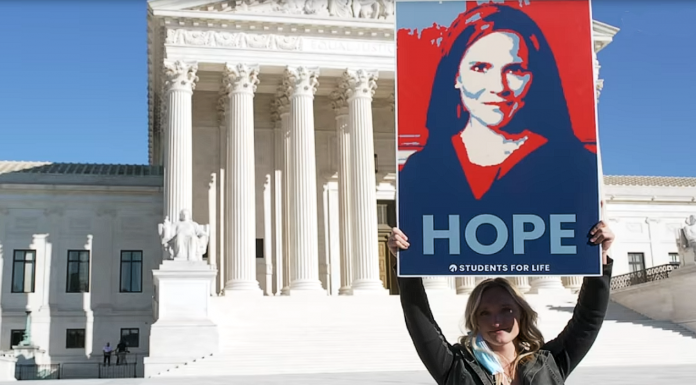According to the reliably conservative members of the US Supreme Court, Trump-appointed justices Brett Kavanaugh and Amy Coney Barrett may lack the backbone when it comes to standing their ground on contentious rulings that involve religious freedom.
A Texas law professor hinted in a recent opinion article for Newsweek what many already had suspected: that when it comes to deciding the fate on some of the Right’s top judicial priorities, the current court is more of a 3–3–3 split than one with a strong conservative majority.
Justices Neil Gorsuch, Clarence Thomas and Samuel Alito regularly criticized the court’s two junior-most members for their lack of conviction in cases where they followed Chief Justice John Roberts by opting to punt on controversial rulings.
“It is fairly common for justices to criticize their colleagues’ legal judgments,” wrote , a professor at the South Texas College of Law Houston. “But it is rare for justices to claim that their colleagues are motivated by cowardice.”
The hesitancy of the right-leaning centrists seemed to surface particularly in cases involving religious liberty and, specifically, in disputes over whether the government is targeting Christian-based groups for persecution based on their beliefs.
Barrett—a devout Catholic with a history of lower-court rulings that favored religious freedoms—sought several times to apply a more rigid standard of law, using case minutiae, for instance, to maintain that California had the right to continue its pandemic-inspired ban on singing in churches.
Although the issue, taken broadly, seems a cut-and-dry violation of First Amendment rights, she and Kavanaugh contended in South Bay United Penetcostal Church v. Newsom that the Christian plaintiffs in the case faced the burden of “establishing their entitlement to relief from the singing ban,” rather than forcing the state to prove that its overreach was justified in the first place.
“Barrett thus used her first separate writing on the Court to rule against people of faith,” wrote Blackman.
Some court watchers indicated that the two junior justices—Barrett in particular—were applying a more “modernistic” approach which flew in the face of their claims of being strict constitutional constructionists in the vein of the legendary Justice Antonin Scalia.
“If an originalist finds that a claim is not supported by originalism, then the inquiry should stop,” Blackman wrote in an earlier piece for Reason. “The Court has no role to play in crafting new doctrine.”
But instead—perhaps to avoid the appearance of fighting left-wing judicial activism with right-wing judicial activism—Barrett has accepted more modern-day precedents as the basis for interpreting the laws.
“She takes decisions of the Warren and Burger Courts as the starting point, rather than beginning with original meaning,” Blackman wrote.
The justices’ openness to selective application of civil liberties in cases such as the church lock-downs could signal a sort of judicial philosophy that, Blackman argued, was akin to “most-favored nation” status—in other words, a selective application that gives preferential treatment to the Establishment.
When approaching the Free Exercise Clause, the two junior justices have used a Scalia ruling from his pre-SCOTUS days to excuse their hesitancy to act decisively in clashes between the state and church.
Scalia’s 1990 ruling in Employment Division v. Smith “held that the government can generally burden religion so long as the law is applied neutrally.”
But, despite agreeing that the standard should be revisited at some point, Barrett and Kavanaugh were unprepared to take the plunge this session in Fulton v. City of Philadelphia, over whether the city could refuse to do business with a Christian foster-care service that excluded single and gay parents.
Although Barrett and Kavanaugh sided with the plaintiffs in the specific case (delivering a unanimous decision that religious conservatives widely celebrated), they avoided the broader push to overrule the now controversial Smith decision and dial back the government’s authority to impose similar restrictions targeting Christians in the future.
While it could be that these rulings touch on something innate in Barrett’s and Kavanaugh’s judicial philosophy, it may also be that the two judges, after having faced tense and contentious confirmation processes, remain uneasy about rocking the boat, given the current political climate.
The Biden administration and congressional Democrats have made clear they are not above coercion with threats to pack the court if it refuses to play ball with the radical leftist agenda.
Regardless, as Gorsuch warned in his response to the Fulton half-measure, “these cases will keep coming until the Court musters the fortitude to supply an answer.”

